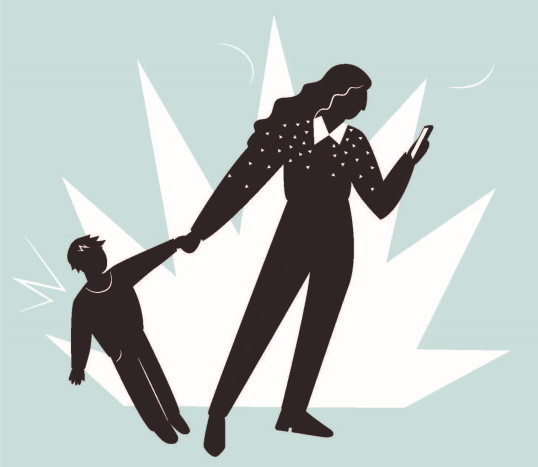Parents of Very Complex Kids
Elaine Taylor-Klaus MCC, CPCC
Attention Magazine August 2022
Download PDF
Underestimated, Undervalued, and Underutilized
 Complex kids are children, teens, or young adults who struggle with some aspects of life, learning, or both. They may not have a diagnosis at all; they may have a single diagnosis, such as dyslexia or ADHD; or they may present with more than one coexisting condition, even three or more. And sometimes, when complex kids exhibit an increasingly complicated combination of symptoms, accurate diagnosis and treatment gets more nuanced and difficult—even for the most experienced providers.
Complex kids are children, teens, or young adults who struggle with some aspects of life, learning, or both. They may not have a diagnosis at all; they may have a single diagnosis, such as dyslexia or ADHD; or they may present with more than one coexisting condition, even three or more. And sometimes, when complex kids exhibit an increasingly complicated combination of symptoms, accurate diagnosis and treatment gets more nuanced and difficult—even for the most experienced providers.
I’ve begun to call them very complex kids.
Over the last three decades, there have been substantial advancements in diagnosis and treatment of kids with neurodiversity. And yet, even though diagnosis and treatment have become more sophisticated, the role of the parent in those processes has not significantly changed. Historically, the parent’s role
- in diagnosis is mostly that of a reporting/managing observer, filling out forms, providing family history, and coordinating medical appointments.
- in treatment is mostly limited to providing feedback on how medication is working.
According to medical protocols, parents are supposed to be included as an essential component in a child’s treatment with referrals to behavior therapy (also known as behavior management training or parent behavior training). A first-line recommended treatment, it’s intended to teach parents how to create an accommodated environment at home, including providing support to implement what they’ve learned. However, as Canadian researcher Adele Diamond, professor of developmental cognitive neuroscience at the University of British Columbia, explained in her presentation* at the 2022 APSARD conference, medical practitioners generally do not refer parents to this aspect of recommended treatment.
Referral to behavior therapy is particularly important when kids present as very complex. First, it prepares parents to observe and report on nuanced behaviors that providers might not think to ask about. Second, parents are able to see their own experience in a broader context, which can offer a wealth of information for providers. Unfortunately, the role of the parent is often underestimated, undervalued, and underutilized; it’s a missed opportunity to enhance diagnosis and treatment in particularly complicated kids.
Parents of very complex kids
There are typically two kinds of parents of complex kids that arrive on my zoom screen, beleaguered, worried, and stressed out:
- Parents who are relatively new to the language of neurodiversity, even though they’ve been dealing with challenges for many years. They are worried and shell-shocked, seeking information and hope. They’re not sure what they should be doing differently to make sure their child isn’t living on their couch in thirty years, but they know something has got to change.
- Parents who feel they’ve tried everything and nothing’s worked, or that things seem to be getting worse, not better. They’re at their wits end and often scared to death. They’re genuinely worried that they might lose their child to mental health, substance abuse, or an early death (either on purpose or by accident), and they have good reason to be concerned.
In both groups, parents tell me they feel desperate, and they want peace… for themselves and for their kids. But there is something noticeably different about the parents of very complex kids, regardless of which group they fit into. Most of the time, there turns out to be something different about their kids, too.
Truth be told, parents of very complex kids generally don’t know they’re outliers. If they’re new to neurodiversity, they are bombarded by the vast availability of free content available to them and still looking for quick fixes and silver bullets. If they’ve been at this a while, they’ve long since given up on failed reward charts; if they’re lucky, they’ve received some kind of behavior therapy training, but it’s not doing enough to move the needle. On some level, they all wonder if it’s their fault that things aren’t improving.
In both groups, they do not fully understand their role as a critical component of their child’s diagnosis and treatment.
Parent observations can offer insight to providers
For over a decade I’ve had the privilege of providing online training, coaching, and support to thousands of parents across the globe. While we work with parents of all kinds of complex kids in our practice, when parents have tried everything else and don’t know what else to do, they often find themselves in my virtual office.
And I can tell you unequivocally: the reality of parenting very complex kids is often much more difficult than many providers understand.
Sometimes, parents of very complex kids don’t share the “dirty little secrets” about the chaos of their family life with clinicians, questions clinicians wouldn’t likely think to ask. It’s not that providers are not open to hearing the full range of what’s happening in their patients’ homes. I suspect it’s mostly because parents typically don’t have a lot of time to spend with their child’s providers, and they carry a huge amount of stigma, guilt, and shame.
Parents want desperately for their child’s provider to solve their problems. As a result, they tend to spend the limited time they have with their child’s provider focusing on how to improve the child’s key symptoms. But by parents’ keeping their own experiences and nuanced observations to themselves, the provider is missing the chance to see a broader context of a child’s challenges.
Parents also hesitate to share full information with their providers because they wrongfully believe that if they were a better parent, they would know how to handle their kids’ challenges. They’re embarrassed, or scared, or hurt, or angry. And frankly, no one wants to tell their child’s provider that:
- they’re hiding the kitchen knives in another room in the house
- they’re regularly crying in the bathroom or the closet because they don’t know how to cope or how to help
- their child has not slept alone in their own bed for years
- they don’t know how to manage an epic meltdown where their child has broken everything in their room,
- they don’t know what to do when their child is sobbing uncontrollably, upset because they couldn’t stop themselves from doing something wrong
- they’re terrified that their child is not demonstrating remorse after what they consider to be appalling behaviors and outbursts
- they can’t believe how abusively their kids are speaking to them
And the list goes on.
A Virtual Office Hours Call
The parent’s role is an essential part of a child’s treatment; and yet, learning to parent complex kids takes time and effort, especially when they’re very complex. In January 2022, about twenty-five parents of kids ranging from age four to twenty-seven attended a virtual office hours call.
The mom of a six-year-old spoke about how hard it is to be the parent to a kid who is always so unsettled, so intense, and so dysregulated. The mom of an eleven-year-old responded that, after eight months of group coaching, she’s finally beginning to understand that it’s her job to support her daughter when her daughter is in pain and there’s nothing she can do to fix it. And then a grandparent whose twenty-three-year-old grandson is living with them talked about what a difference it has made for her grandson since she’s been in a group for parenting young adults. She’s finally learning to let go of her judgment.

Parenting complex kids is complicated. It isn’t enough to give parents reward charts and websites. Parents need training to be the best parent they can be for their complex kids and to be the most effective, contributing member of their child’s treatment team.
Commonalities in parents of very complex kids
In the winter of 2021, Thomas E. Brown, PhD, invited me to present in a panel session on “Adapting Evaluation and Treatment of ADHD for High IQ Kids and Adults on the Spectrum” at the 2022 APSARD conference. In preparation, I began to look critically at the parents of very complex kids I’d worked with over the years whose kids fit that profile. And I noticed some distinct and telling trends.
There were subtle commonalities of symptoms among the kids, themselves, which I shared in that panel presentation. And I discovered that the parents’ personal experiences had commonalities, as well. It begged the question whether asking a few questions of parents could potentially provide insight and clues for providers to improve diagnosis and treatment outcomes for very complex kids.
While this is by no means a quantitative assessment, it does provide strong qualitative insight that suggests a need for further investigation. It’s very possible that common experiences among parents could guide providers in discerning whether a child is facing run-of-the-mill diagnoses or whether they’re treating a very complex child who needs more nuanced evaluation and treatment.
Many parents of complex kids struggle with parenting. They may feel out of touch with other parents, have fundamental disagreements about parenting approaches with their co-parents, face challenges in their marriage, experience excessive yelling in the home, and more. But there is another layer of impact on parents that happens with very complex kids that can shed some light on understanding the depth of a child’s challenges.
In my practice, I noticed that parents of very complex kids:
- started seeking support (though they may not have gotten it) when their child was at an early age, often in the infancy or toddler years
- are on the verge of breakdown or burnout from dealing with extremely challenging behaviors for many years
- families of origin have “severe” or complicated mental health histories or an adopted child’s full family health history is unknown
- have consulted multiple specialists and have implemented countless interventions, with nothing seeming to help enough to gain any real traction
- often were guided to focus treatment on a single disorder (OCD, anxiety, ADHD) to the exclusion of addressing coexisting conditions
- are tolerating extremely disrespectful and sometimes abusive behaviors from their own kids
- struggle to get respite because the child is obsessively attached to one parent, refusing support from other adults sometimes including a co-parent (and despite a tendency to be alternately abusive and attached to that one parent)
- are often not sleeping in their own bed (or the child is sleeping with them)
- have reached the point of setting little or no expectations at all for their child
- continue to seek help from new providers because they know something is missing, that they don’t have full information
- see some improvement in relationships and family dynamics after receiving behavior therapy training and coaching, which tends to shed light on a deeper level of problem and need for further diagnosis
While these observations are not statistically significant, they begin to tell a story that is worthy of our attention.
Our very complex kids are in pain. They’re suffering, and too often not getting the support they need.
And so are their parents.
When very complex kids are not yet appropriately diagnosed and treated, their parents face a kind of psychic pain that can be unbearable to witness. Historically, the role of the parent has been underestimated, undervalued, and underutilized. Understanding the parents’ experience could give us a powerful lens to deepen our understanding of what’s happening with very complex kids.
It is essential for parents and providers to collaborate more intentionally with each other to provide comprehensive diagnosis and treatment for complex kids, especially the very complex among them. For that to happen, practitioners must guide parents to proper training and support, and take the time to find out more about how a parent is experiencing their child’s complexity. And parents must muster the courage to vulnerably share the whole truth of their family’s experiences with their caring helping professionals.
FOOTNOTE
* Molina B, Tripp G, Diamond A, Weiss M. Reinforcement/reward mechanisms, response to punishment by country: interventions for executive functioning. Presented at 2022 APSARD Conference. January 14, 2022.
 Elaine Taylor-Klaus, MCC, CPCC, has worked as a virtual coach for parents of complex kids, ages four to forty-four, for more than a decade. The author of The Essential Guide to Raising Complex Kids with ADHD, Anxiety, and More, she has supported thousands of parents across the globe in training programs, group coaching, and private coaching as the co-founder of ImpactParents.com.
Elaine Taylor-Klaus, MCC, CPCC, has worked as a virtual coach for parents of complex kids, ages four to forty-four, for more than a decade. The author of The Essential Guide to Raising Complex Kids with ADHD, Anxiety, and More, she has supported thousands of parents across the globe in training programs, group coaching, and private coaching as the co-founder of ImpactParents.com.
Have you enjoyed this article? Join CHADD today to receive Attention magazine as a membership benefit.
